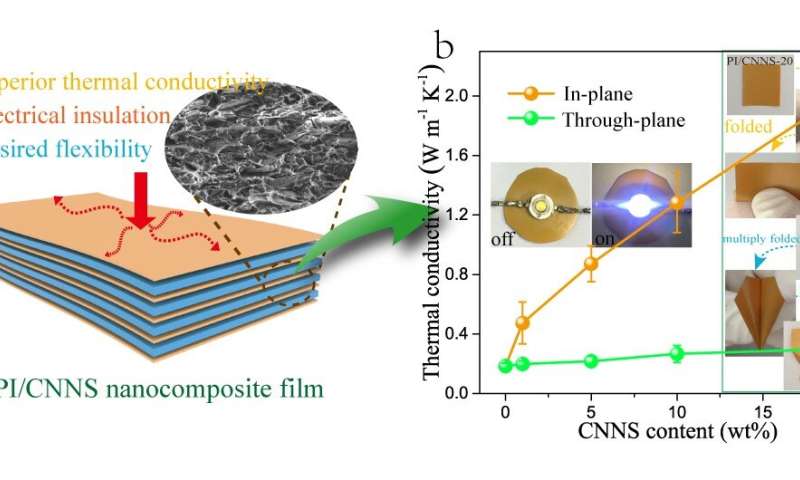Thermally conductive polyimide film: A better way to dissipate heat in electronic devices
by Zhang Nannan
Recently, a research team led by Prof. Tian Xingyou and Zhang Xian from the Institute of Solid State Physics, Hefei Institutes of Physical Science developed highly thermally conductive polyimide film with superior flexibility and electrical insulation.
Efficient heat management is essential to dissipate excessive heat in improving the efficiency and reliability of electronic devices. And in recent years, polymer materials have been widely used as substrate of microelectronics due to low cost, light weight and easy processing, with polyimide (PI) film being considered as a desired material for OLED flexible substrate.
However, limited by its low thermal conductivity (0.18 Wm-1K-1), PI usually needs to combine with highly thermally conductive fillers to strengthen its thermal conductivity.
In this work, the researchers used facile imidization-induced orientation method to fabricate layered PI/carbon nitride nanosheets (PI/CNNS) flexible nanocomposite films.
CNNS realized in-plane self-orientation during solvent evaporation to form continuous thermal pathway in PI film basing on the orientation of PI molecules during imidization and strong interaction with PI.
The results showed that the in-plane thermal conductivity of PI/CNNS nanocomposite film reached up to 2.04 Wm-1K-1 with low CNNS loading (20 wt%) which was about eleven times of the corresponding pure PI.
Furthermore, the potential application of the PI/CNNS nanocomposite films for effective heat dissipation was confirmed by experiments and simulation. The PI/CNNS nanocomposite films kept superior electrical insulation property and thermal stability.
This work expands the application of CNNS and provides a facile, efficient approach to the design of high thermal conductive materials.
More information: Yanyan Wang et al. Imidization-induced carbon nitride nanosheets orientation towards highly thermally conductive polyimide film with superior flexibility and electrical insulation, Composites Part B: Engineering (2020). DOI: 10.1016/j.compositesb.2020.108267
Provided by Chinese Academy of Sciences